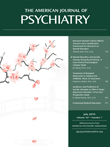In This Issue
Clinical Guidance: Approaches to Treatment-Resistant Depression in Adolescents
Adolescents who had not responded to an initial trial of antidepressant treatment improved when cognitive-behavioral therapy or a mood stabilizer was added to their treatment during the first 12 weeks. Emslie et al. (p. Original article: 782) report that these treatments added after 12 weeks did not alter outcome. Venlafaxine was no more effective than a serotonin reuptake inhibitor as a second-line drug, although there was a nonsignificant trend for it to be helpful later in the course of treatment. Adolescents who had remissions were already showing improvement at 6 weeks. More vigorous intervention is recommended for those who are not continuing to improve between 6 and 12 weeks (figure, above). John Walkup points out in an editorial (p. Original article: 734) that the pace of pharmacological intervention was more rapid than in general clinical practice, which may account for the relatively good outcome, with 39% of patients remitted by 24 weeks.

Research Domain Criteria
The National Institute of Mental Health (NIMH) has initiated research to determine how genetic and neurobiological abnormalities could be used to identify different pathophysiological types of mental disorders. NIMH Director Thomas Insel and colleagues (p. Original article: 748) envision a matrix of domains, ranging from molecular to psychosocial, that can specify treatments and outcomes more accurately than phenomenological diagnosis alone can do.
Clinical Guidance: Maintenance Treatment of the Bipolar II Patient Who Responds to an Antidepressant
Although depression is the major burden of bipolar disorder for many patients, most studies show that antidepressants do not improve outcome for either depression or mania in bipolar patients. However, a subgroup of bipolar II patients does respond to antidepressants. Amsterdam and Shults (p. Original article: 792) report that this subgroup continues to have less recurrence of depression when they are treated with fluoxetine than if they are switched to lithium or placebo (figure, below). In an editorial (p. Original article: 738), Trisha Suppes points out that even in this subgroup, selected for a prior response to fluoxetine, maintenance treatment with fluoxetine results in more mood instability than occurs with lithium or placebo. Nonetheless, they appear to have an overall positive course with antidepressant treatment.

Clinical Guidance: Treatment of Obsessive-Compulsive Symptoms in Schizophrenia
Rodriguez et al. (CME, p. Original article: 754) report the case of a patient with marked obsessional symptoms during his first episode of schizophrenia. These symptoms did not respond to treatment with typical or atypical antipsychotics combined with selective serotonin reuptake inhibitors or clomipramine. A brief trial of exposure and response prevention therapy seemed helpful, and the combination of clozapine and lamotrigine led to substantial improvement. Targeting of obsessive-compulsive symptoms with these therapeutic modalities may be indicated for patients whose obsessive-compulsive symptoms are more marked than is consistent with their other psychotic symptoms or persist after treatment of the psychosis.



